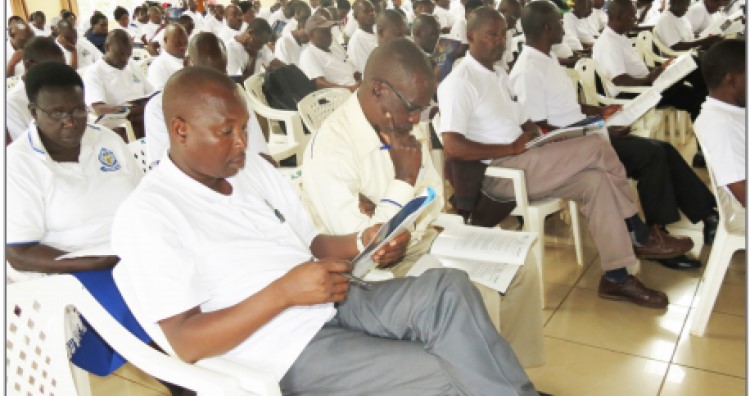Trans National Times Sacco, formerly known as Trans Nzoia Teachers Sacco, now targets members outside the teaching fraternity
The Trans National Times Sacco, is officially the new name that replaces the ‘Trans Nzoia Teachers Sacco’ in a move geared towards accommodating more members. This was unanimously adopted during the Sacco’s 30th Annual Delegates Meeting (ADM) and expectations of bring non teachers on board are now high. At the same time, the Sacco unveiled a new van to boost marketing initiatives in the larger western Kenya region. The chief guest, Mr. Michael Jamhuri who is also the County Director of Trade Trans Nzoia County, praised the initiative to change name and urged locals to massively join the Sacco. He said any business person and common residents can now benefit from the services of the Sacco since it now represents a neutral institution that will offer better services.
Jamhuri promised that despite the challenges that the Sacco is facing, the county government will provide a conducive environment for Saccos to thrive. He promised to rally workers from the county government to join the Sacco and make it their financial service provider. Speaking during the ADM at Kenya Ministry Training Institute, Trans National Times (TNT) Sacco Chairman Robert Omari said the Sacco will introduce electronic loan services to enable members’ access loans through their mobile phones. Omari said TNT will spend Sh. 1Million in introducing the service before the end of this year. “The service will apply to short term loans so that members don’t need to visit the offices in Kitale town to obtain the loans,” he said
In the supervisory report submitted to the Sacco, the supervisory chairman Alphonse Maliambo advised that introducing mobile loans will attract more members. “Establish this facility to attract more members. Online loan processing should be implemented to embrace digital competition in the market,” he pointed out. Omari pointed out that the initiative is meant to encourage uptake of loans from the Sacco. Last year the Sacco had an improvement of 36% on loan disbursement. The E-loan service is among the future plans that the Sacco is undertaking to encourage registration of more members that will grow its business.
In 2015 the Sacco had a membership of 7781, 8285 in 2016, 9173 members in 2017 and 9681 members in 2018 as captured in the supervisory report. The report noted that E-loan services will enable the Sacco to retain most of its recruited members. “We have observed that the Sacco is failing to retain most of the recruited members. Once mobile loans are introduced it will attract more members and retain them,” disclosed the supervisory chairman “Membership is a fundamental yardstick of measuring our growth, stability and sustainability. Though membership has been increasing, the number of dormant members is high,” he added.
In 2018, the total deposits of the Sacco hit Sh. 709,914,713, a decrease from 2017’s members’ deposits of Sh. 736,067,650. In 2016 the Sacco recorded members’ deposits of Sh. 685,120,650 and Sh. 598,205,360 deposits in 2015. According to the supervisory report, the drop of deposits in 2018 was attributed to high rate of exits caused by retirement, voluntary cessation, natural attrition and defaults from deposits. According to the Sacco’s chairman, TNT Sacco was recognized during the Ushirika day celebrations in 2018 as the best improved and best capitalization Sacco in the country. Apart from the E-loan service, TNT will review payment of interest on members’ deposits quarterly. The Sacco has been issuing interest on members’ deposits after 12 months. Omari noted that the Sacco will also conduct aggressive marketing, account opening, being more visible and proactive in debt recovery approaches. For efficient running of the Sacco and to survive in the changing business environment, Omari noted that the Sacco will amend some of its by-laws.
The by-laws to be amended are, by law 39 on electoral laws and branches, by law 40 on delegates election, by law 41 on duties and responsibilities of delegates and by law 42 on delegates meeting. The changes to bylaws according to the chairman are meant to enable the Sacco conform to changes in education policy, conform to philosophy of opening the bond and inclusivity and enhance board of directors and delegates efficiency and effectiveness in discharging their duties. Others are to enhance the delegates’ ability to deliberate and make sound decisions and membership loyalty, and reduce on capital flight due to cessations. Changes in the bylaws and other amendments in the Sacco are set to provide a conducive environment for the Sacco to manage the challenges it has been facing. Some of the challenges he mentioned were high demand for loans, short life span of accounts opened by young members and high number of retiring members. A major challenge however, was the changes in international accounting standards covering credit losses. Omari noted that a new model known as expected credit loss model has been introduced by the International Finance Reporting Standards (IFRS 9) to replace the International Accounting Standards (IAS) recognition of credit losses model. The chairman said that the new model by IFRS creates larger loss reserves since they include estimates of future losses that are yet to be incurred as an economic matter as opposed to the old model under IAS whose recognition of credit losses was based on Incurred Credit Loss (ICL).

